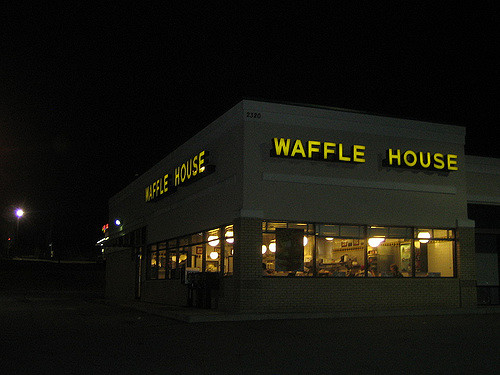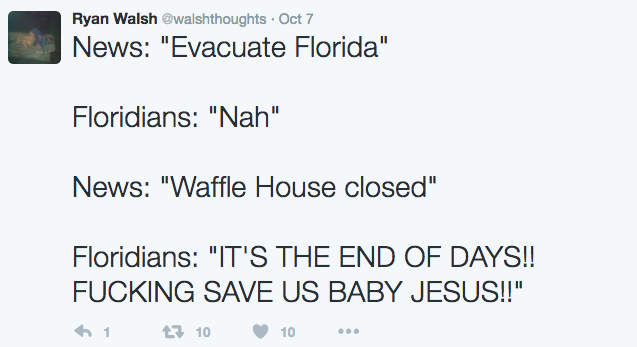The Strange Reason People Trust Waffle House More Than Officials During Extreme Weather

By:
Instead of heeding warnings and alerts from the government or weather professionals, there's another system some Americans turn to during a major weather event: Waffle House.
With many abiding by what is known as the "Waffle House Index," or the amount of Waffle Houses open during a storm, some people trust it more than warnings from officials when there's the threat of extreme weather.
 Flickr/Mychal Stanley - flic.kr
Flickr/Mychal Stanley - flic.kr
The diner chain, with more than 1,500 locations in the southern part of the United States, remains open "24 hours a day, 365 days a year," according to its site.
The restaurant boasts that it's always open, seldom closed, so when it does shut its doors, people take notice, including the federal government.
The Federal Emergency Management Agency (FEMA) gets an informal count of how many Waffle House locations are closed during a storm, according to media outlets.
“When business like that are closed, that’s a good indication that resources are probably going to be needed for the survivors there in that area,” Will Booher of Florida’s Division of Emergency Management told Fox News in 2012.
One Twitter user's tweet in October about Hurricane Matthew sums up the importance of the "Waffle House Index" for some Americans as an emergency warning.
 Twitter/@walshthoughts - twitter.com
Twitter/@walshthoughts - twitter.com
So why do some people look to Waffle House, but ignore warnings from officials?
Although it's unclear exactly why people look to the Waffle House, specifically, there are some potential explanations for why Americans ignore warnings from officials.
Before Hurricane Matthew made landfall in the Southeast, there were state and federal warnings about the serious nature of the storm which instructed people to evacuate the area. More than 2 million people were under evacuation orders when Hurricane Matthew approached, but thousands of people still didn't leave. In South Carolina, only about 35 percent of residents actually evacuated, according to the Associated Press.
"Research shows that several factors strongly influence the decision to evacuate," Texas A&M education professor Jennifer Horney wrote for the AP. "One of the most important is previous disaster experience." If officials over-promised on hurricane damage in the last storm, residents will be less likely to believe them the next time and Horney used three hurricanes as an example. Severe storm Hurricane Hugo hit the U.S. in 1988 and four years later when weaker Hurricane Emily hit the area people evacuated at similar levels. However, when severe storm Hurricane Fran landed eight years later, less people evacuated because they remembered the false alarm of Hurricane Emily.
Horney wrote that factors like evacuation cost and mobility, can also play a strong role in a decision not to evacuate, but another factor is that people just don't believe it will be as bad as warned by government officials.
This isn't a new phenomenon. An analysis more than 20 years ago for the Coastal Management Journal found that people didn't trust government officials during storm warnings.
"The perceived lack of reliability of gubernatorial warnings coupled with dependence on the media suggests that residents find other sources of information more personally relevant," wrote the study authors. "Thus, while residents do not find that officials are 'crying wolf,' they are searching elsewhere for information to assess their own risk—what does it mean to me if there is a wolf?"
The overall trust in federal government officials by Americans is "historically low."
The Pew Research Center found in November 2015 that American trust in the government has been consistently declining since 1958. In 2015, only 19 percent of Americans said they could trust Washington to do the right thing "just about always" or "most of the time."
